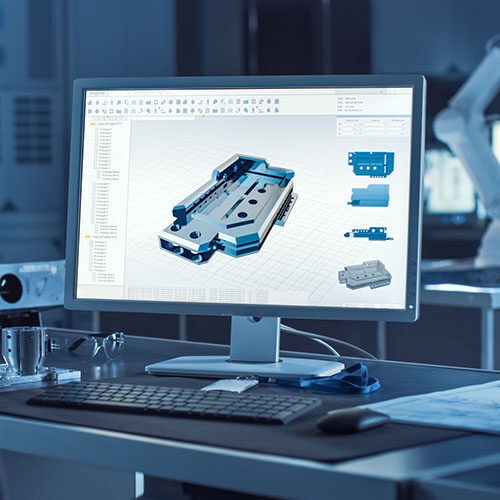
The importance of using an ERP to manage projects
Project management is an area that many businesses, including manufacturers, have a hard time effectively mastering. But successful project management is one of the key tasks that manufacturers need to become proficient at, to get their plants running smoothly. In effect, all jobs that a manufacturer takes on can be viewed as projects, with many variables that need to be managed adeptly.
Investing the proper resources in project management is important for manufacturers. A good project management and priority management system will help manufacturers streamline their operations and get jobs running through their shop more smoothly, with fewer hiccups and delays, meaning more jobs will be completed and delivered on-time. With effective project management, you can move your plant from one that is constantly putting out fires and just trying to stay on top of orders, to one that is running efficiently and optimally.
One of the most effective project management tools that a manufacturing plant can use is an ERP system. An ERP system will connect your entire shop, allowing for better communication and collaboration, meaning that you can more effectively manage jobs—and your entire manufacturing plant. An ERP gives a manufacturer an all-in-one place to store and manage the complete range of information it needs for any job.
Better collaboration
With the level of collaboration an ERP provides difficult tasks, for example ordering parts and raw goods to ensure they are available for production on time, are easier. An ERP system creates a deeper level of connection between departments and can easily let the engineering department interact, communicate, and share information with purchasers and production managers. Everyone can get the information they need to do their jobs effectively—like, including knowing what long-lead items are needed, so that they can be ordered early on during the design phase, which will ensure the items arrive in time.
Focusing on the right elements
Beyond the level of communication and collaboration that an ERP brings to an organization, ERPs will also include specific modules that will help manufacturers set milestones, budget and follow the progress of jobs, schedule jobs efficiently, and monitor the progression of a job through a shop. All of these features help manufacturers keep on top of jobs and more effectively manage their shop.
Scheduling is one of the key tasks that a project manager in a manufacturing plant needs help with. An ERP with a good project management module will let you move beyond the whiteboard and plan and schedule labor and work centers taking into consideration efficiency, actual capacity, calendar, and overtime. You will also be able to schedule labor hours by competencies or department, without having to complete routing details in BOMs.
Setting and tracking milestones—those key indicators that let you know if a job is running on time or behind schedule—is also important. An ERP will give you real-time data related to the progression of any job. You can create a dashboard, add milestones related to your material, customer approval, and finished product to visualize how you are progressing with jobs, and if you are meeting business goals and customer expectations.
An ERP will also give your entire staff key insights into your operations, and what jobs you have on the go. This will help your production and operations managers set the right priorities, and make sure that your teams are working on the right jobs and tasks.
Investing in your team
As important as it is to invest in the right ERP system to help you better monitor and manage projects, it’s also important to invest in your team. An effective project manager not only has the right tools that she needs to get a project completed, but she also has the know-how and resources to guide projects through her shop.
Investing in proper training and education for your staff will go a long way in turning your organization into one that is proficient in project management. Ensure your staff know how to properly use your ERP—one of the key steps in implementing a new ERP—so that they know how to get the most out of the tool you have given them.
But training your staff on project management techniques and practices is also important to ensure that business results are achieved. And remember, don’t just focus on the how-to’s. You want to also concentrate on the whys—you want your staff to think, to ask questions, to push back, to solve problems and to work as a team to deliver the expected business results.
The importance of consistency
Properly keeping track of goals and objectives is a key factor for successful project management. To keep on top of your projects, it’s important to keep the following in mind:
- Alignment of strategic goals: Business and project goals must align and support each other. Ensure your entire team is working on the correct set of priorities for your manufacturing business.
- Realistic project planning: Your team needs to set proper expectations and achievable project plans that are based on accurate real-time data.
- Clear objectives: Your team has a clear guide to tackle tasks, effectively boosting their focus.
- Risk management: Project managers get ahead of issues and find solutions as soon as possible.
Having a proactive leadership style, both from senior management and from your project manager, is also important and will ensure sure everything is communicated clearly to the right employees will lead to success. A proactive leadership style will also sent the tone for your organization, showing that you and your team are empowered to tackle problems, and that planning for effective project management is an important task in your organization.
Closing thoughts
Effective project management is one of the key tools that a manufacturer needs to manage their successfully manage their operation. Good project management helps you to keep track of the time, budget, and scope of any job in your shop. Furthermore, effective project management, achieved with an ERP system, aims to get and keep everybody on the same page, ensuring that everyone is marching to the same beat. And a more streamlined and effective shop means you will be able to reach your business goals.
Get your eBook Scared to implement a new ERP?
"*" indicates required fields



